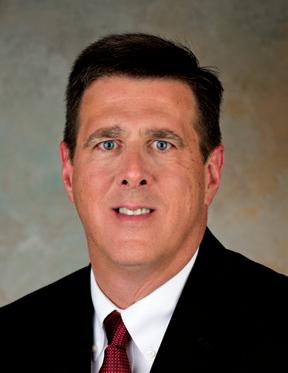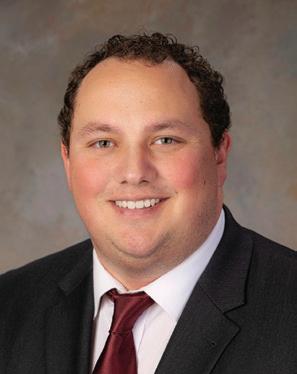
6 minute read
Around Town With Shaye Baker
Photo Contributed By Shaye Baker
Financial freedom? A concept that never even crossed my mind until a couple of years ago. If you’d asked me what it meant back then, I would have likely conjured up from my consumeristic mind, “Being able to buy whatever I want.”
Advertisement
We live in the most accessible generation in the most advertised-to society of all time. With social media, billboards and 10 popup Google ads on every screen we look at, it’s impossible to know how many advertisements we see a day, but estimates range from 4,000 to 10,000. And that number will only grow with time until we have to listen to an ad before we can answer an incoming call — not to give the marketing maniacs any ideas.
So how do we become financially free in a culture where we’re constantly having our heartstrings tugged on by some company that’s telling us we can never find true happiness until we purchase the thing that only they have to offer? Well, financial freedom really isn’t about buying more stuff. It’s more tied to gratitude, contentment and delayed gratification.
My financial journey was altered drastically and forever when I ran into the woman who is now my fiancée. She was a good bit younger than me but had a bachelor’s degree, a master’s degree, money in the bank and zero debt.
Meanwhile, I was saddled with roughly a quarter-milliondollar yoke hanging around my neck.
The odd thing, it really didn’t feel that heavy at the time. Or at least I didn’t feel the full weight of it until I met Savannah. I was in debt, sure. I had some back taxes I was paying, a business loan, a personal loan, some debt that had hung around since college, a truck loan, a financed lawnmower and a mortgage on my house and land. And that’s just the way I thought it was for everyone.

But somehow, this young lady had a lot of accomplishments, no debt and had only had a big girl job for about a year at the time I started getting to know her. I had probably made a million dollars in my life by then, or close to it, and I was in a deep hole.
This newfound information, along with the current phase of sanctification that the Lord had me in at the time, sent me searching for answers as to how I had gotten it so wrong. I could have blamed someone else. Could have blamed the public school system, of which I graduated valedictorian in my class and don’t believe I was ever taught as much as how to write a check in school as it pertained to finances.
But it wasn’t time to blame anyone. I was sitting in my own mess and suddenly could see it for what it was. The first step out came by way of exposure to Dave Ramsey. I had heard of Dave Ramsey several times along the way but had not aimed much attention in his direction. However, as I started asking questions to people in my small groups and church, his name kept popping up.
I wrote all of my debts down back on June 20, 2021, to the penny as best I could tell. The tally came to $239,237.71. That’s a number I can recite by heart now, not because of shame or guilt. But because that was the starting point of my financial journey to get out of debt, and therefore the baseline that I often go back to to subtract the total debt I’ve paid off from.
But before we get into that, I want to tell you a little more about the process it took to make the progress I’ve made. For starters, I didn’t do it alone. It took humility, which is not always my strong suit. A lot of pride is tied to things in this life, especially money. So we don’t like to talk about finances with one another. But the more I opened up to friends that were close to me, the more I was able to benefit from their past mistakes and successes.
We are not supposed to live this life alone, in any regard. Isolation is the devil’s playground and if he can get us alone, he can wreck our lives. One of my favorite passages from the Bible that illustrates this is Ecclesiastes 4:9-10, “Two are better than one, because they have a good return for their labor. If either of them falls down, one can help the other up. But pity anyone who falls and has no one to help them up.”
And then there’s the wisdom that comes from Proverbs 24:16, “… for though the righteous fall 7 times, they rise again … .” It’s important to note here that this verse does not read that the righteous never fall, but instead that they rise again.
Armed with these truths, I joined Dave Ramsey’s Financial Peace University (FPU) small group led by a member of my church. This class opened my eyes to what it referred to as the eighth wonder of the world — compound interest. I learned for the first time just how much money my money could make, once I had some. But to begin with, I had to pay off my debts.

Using Dave’s Debt Snowball game plan, I started paying my debts off from smallest to largest. Then I would apply the payment I was making on the lesser one to the next one. This had me gaining momentum very quickly and I started to see how this could actually work. I could pay off debt.
Pretty soon I had paid the mower off, paid off the personal loan and was chewing away on the back taxes. But that was just enough to get me good and excited. I wanted to take a quick and big bite out of it, so I sold my Silverado for the $12,000 I owed on it and bought a little $2,000 1999 Buick Century that I’m still driving today.
Now before you start telling me you can’t drive a car like that, you’d be surprised what you can do when you make your mind up. My mind was made up. I didn’t want to live the way I was living anymore. Another impactful verse I heard for the first time while going through FPU, “… the borrower is slave to the lender.” - Proverbs 22:7
That landed pretty solid with me when I heard it almost a year and a half ago. At the time, seven different lenders owned the majority of my most valuable asset, my time. I was a slave chasing my tail in seven different directions. I’ve since paid off $44,232.62, gotten rid of all my consumer debt and only owe on my house and land. All glory to God.
It hasn’t always been easy, but you’d be amazed at how fun and satisfying it has been. After the impact that FPU had on me, I wanted to pay it forward and co-led the small group with a friend last fall. I enjoyed getting to be a vessel used to shine some light for those that attended.
I also enjoy being creative and looking for new ways to save money and live within my means. I’ve always been a hard worker, willing to cut grass, clean toilets or whatever it took to make a dollar. I’ve always been good at making money, but I was always better at spending it. That’s how debt is created.
I didn’t have a money-making problem, I had a moneyspending problem. The road to financial freedom isn’t paved by the money you make, but instead by the money you keep. Now I meal prep, operate within a budget, and by the grace of God, through a few more years of intentional decisionmaking, my wife and I will be completely debt-free in 10 years.
A lot can happen in life, and I certainly can’t plan for everything. But that doesn’t mean living life without a plan is the way to go either. That was the line of thinking that got me into a mighty big hole to start with. I try to live more along the lines of Proverbs 16:3 now, “Commit to the Lord whatever you do, and he will establish your plans.” And Jesus is definitely anti-debt.
My advice if you find yourself in a similar position to the one I was in two years ago: Take a long look in the mirror. Realize there’s a better way. Talk to people who care about you and are in a better spot than you are financially. Listen. Learn. Grow. Don’t focus on the money for the sake of the money. Don’t become greedy. Be generous during the process. Tithe throughout the process. And watch what happens.
















